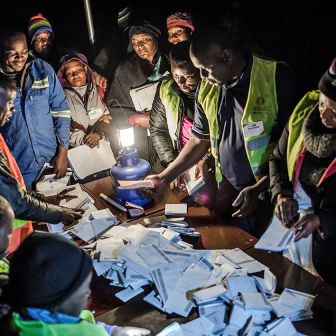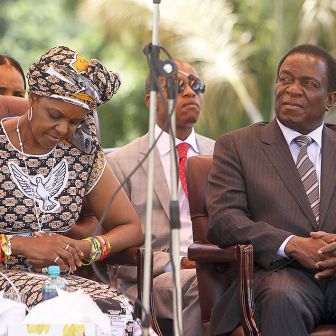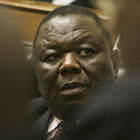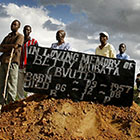I RECENTLY KILLED a goat in the hope of selling the meat for US dollars. Like many Zimbabweans, I have become accustomed to trying to make a quick buck to cope with the economic struggles and food shortages. Unfortunately for me, no customers came forward to buy the goat meat. Now I am cracking my head to come up with another money-making deal that can get me American currency. The reason is simple: my landlord wants her rent in US dollars. She says Zimbabwean dollar notes are like tissue paper and she has no need of them, so I am left with a little choice but to hassle.
To cushion themselves from the economic shocks, Zimbabweans have taken to making deals of all shapes and sizes. The word “deal” is perhaps the most commonly used and abused in Zimbabwe. Everyone – men and women, young and old – is involved in some sort of a deal aimed at generating quick money.
Millions of Zimbabweans have taken off to the eastern part of the country, where a diamond field has been discovered. Many young people, in particular, have dropped their educational studies to try their luck. The diamond business has become the quickest way to get rich. But with government now clamping down on the fortune seekers, using guns, dogs and helicopters, the business has become bloody and dangerous.
In Harare, the streets are packed and abuzz with people whispering and milling about, all in search for a quick deal. Basic commodities such as cooking oil, milk, bread and soap, which are completely absent in the country’s supermarkets, can be found in abundance on the streets. People hawk everything from ice-cream, canned beer, fresh produce to anything else that you can imagine. It’s a wonder that these goods are only available on the streets and not in the shops. But, in Zimbabwe today, anything goes. To cope with the shortage of basic commodities, more and more people are resorting to crude barter – a cabbage for an egg or a few tomatoes for a loaf of bread.
The most lucrative deal on the streets of Harare is foreign exchange trading, with the entire city having been transformed into mini Wall Street where all the world’s major currencies are traded on a minute by minute basis. The street-based forex dealers are well informed and so, as the global financial meltdown hits economies across the world, they are quick to change their rates. But forex dealing on Harare’s streets is particularly risky as hungry policemen are always on the lookout to make a quick buck by arresting dealers.
The strange thing is that while forex dealing is regarded by the authorities as illegal, the government has mandated some shops to sell goods in foreign money. It’s not that the country is short of foreign currency; over the past ten years millions of Zimbabwe have left their homeland in search of greener pastures in the diaspora, and most Zimbabwean families depend on income from relatives and friends living overseas to stay alive. Money transfer agencies in the country such as Western Union must be making big business from money that Zimbabweans in various parts of the world are sending home.
An ordinary Zimbabwean’s quest is very simple: it’s to survive the day and live for tomorrow. In Zimbabwe, you soon learn that the human heart can be broken many, many times but getting up, having faith and hope in tomorrow is non-negotiable. For almost a decade now, Zimbabweans have weathered the storm, always twisting and turning like garden worms. It’s a common saying in Zimbabwe that people will always come up with a plan to stay on top of the economic struggles. Yet it’s a paradox that while the whole globe is being shaken apart by the unravelling of the free market system, Zimbabwe, with its ever-spiralling hyperinflation, appears to be immune. Or rather the country has been too steeped in distorted market dynamics, isolating itself from the rest of the world to such an extent that the ongoing global financial meltdown seems like a distant joke.
According to local economists, US dollar inflation (about 5 per cent in the United states) easily exceeds 50 per cent in Zimbabwe. Because it is a seller’s market, traders make sure to exploit their opportunities to the full. In a way, it’s a dog-eat-dog scenario, with everyone seeking to make money from the next person, hence the high US dollar inflation. As in many parts of the world, the black market for goods in unregulated; the consumers are the ones who suffer, especially the poor, elderly and sick.
For weeks, the country’s political protagonists, President Robert Mugabe and Movement for Democratic Change leader Morgan Tsvangirai, have been engaged in deadlocked talks over a power-sharing deal. But like my attempt at selling goat meat, that power-sharing deal increasingly looks like it will fail, and that will worsen the plight of ordinary Zimbabweans, some of whom are now only surviving by eating wild fruit.
I don’t think the political characters in Zimbabwe will agree on anything because there is too much mistrust. The big old men want to suck the country’s breast until it runs dry. For now, I know that the people are just on their own, and they have to come up with their own deals, just like I have, in order to survive. On the streets, no one talks about the political negotiations like we did immediately after President Robert Mugabe and MDC leader Morgan Tsvangirai signed the deal on 15 September. The fruitlessness of the talks has worsened the state of the economy.
What is most significant in all the political madness is the resilience of the people of Zimbabwe. In spite of the disintegration, people still laugh, cry and love. It’s almost reminiscent of a lotus flower rising out of muddy waters.
I am fully convinced that the Zimbabwean story is proof enough that within the human heart are all the resources required for survival in spite of the shape or character of the external circumstances. Using imagination and innovation, many Zimbabweans have managed to withstand the scourges of a failed political system. So while my goat deal may have failed, I have not given up hope: I know God will help me somehow.
The ordinary Zimbabwean is long-suffering and patient and carries a hope that the country will become as beautiful as a flame-lily someday. And unlike other African countries, Zimbabwe has managed to steer away from total mayhem that causes a total collapse of the nation-state, and therein is the country’s hidden beauty. It should not come as a surprise someday in the future if Zimbabwe is held up as model state, but for now, we are running about like headless chicken. •




